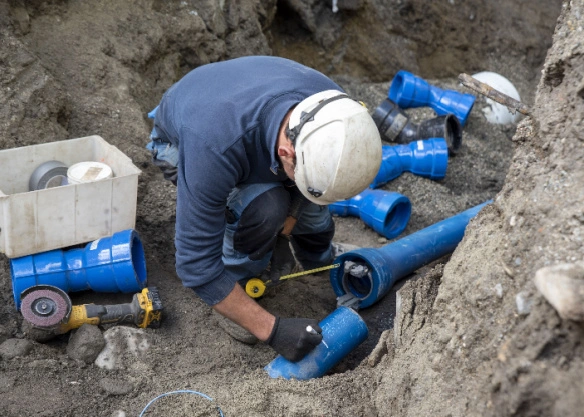What is the Life Expectancy of a Water Line?

Water lines are a crucial component of any residential or commercial plumbing system, providing a reliable supply of water. However, like all infrastructure, water lines have a finite lifespan and will eventually require maintenance, repair, or replacement. Understanding the life expectancy of a water line can help homeowners and property managers plan for future water line replacement and avoid unexpected disruptions. This blog will explore the factors that influence the lifespan of water lines and offer tips for extending their longevity.
- Factors Influencing the Life Expectancy of Water Lines
- Signs That It’s Time for Water Line Replacement
- Tips for Extending the Life of Water Lines
- Conclusion
Factors Influencing the Life Expectancy of Water Lines
The life expectancy of a water line depends on several factors, including the material of the pipe, installation quality, environmental conditions, and maintenance practices.
Material of the Pipe
Different materials have varying lifespans. Here are some common types of water line materials and their typical life expectancies:
- Copper: Copper pipes are known for their durability and can last 50 to 70 years or more. They are resistant to corrosion and suitable for both hot and cold water applications.
- PVC (Polyvinyl Chloride): PVC pipes are commonly used for cold water supply lines and have a life expectancy of 25 to 40 years. They are lightweight, easy to install, and resistant to corrosion.
- CPVC (Chlorinated Polyvinyl Chloride): CPVC pipes are used for both hot and cold water lines and can last 40 to 50 years. They offer better heat resistance than standard PVC.
- Galvanized Steel: Galvanized steel pipes have a lifespan of 20 to 50 years. However, they are prone to corrosion and rust, which can reduce their longevity.
- PEX (Cross-linked Polyethylene): PEX pipes are flexible, easy to install, and resistant to scale and chlorine. They have a life expectancy of 40 to 50 years.
Installation Quality
The quality of the installation plays a significant role in the lifespan of water lines. Properly installed pipes with secure fittings and connections are less likely to develop leaks or other issues. Poor installation practices, such as inadequate support or incorrect joint sealing, can lead to premature failures and the need for water line replacement.
Environmental Conditions
Environmental factors, including soil conditions, temperature fluctuations, and water quality, can impact the lifespan of water lines. For example:
- Soil Conditions: Acidic or alkaline soil can corrode certain pipe materials, reducing their longevity. Rocky or shifting soil can also cause physical damage to pipes.
- Temperature Fluctuations: Extreme temperature changes can cause pipes to expand and contract, leading to stress and potential cracks. Insulating pipes can help mitigate these effects.
- Water Quality: Hard water with high mineral content can cause scale buildup inside pipes, reducing flow and increasing wear. Water with high chlorine levels can also degrade certain pipe materials over time.
Maintenance Practices
Regular maintenance and timely repairs can extend the life of water lines. Practices such as inspecting for leaks, addressing minor issues promptly, and ensuring proper water pressure can prevent significant damage and prolong the lifespan of pipes.
Signs That It’s Time for Water Line Replacement
Knowing when to replace a water line is essential to avoid water damage and ensure a consistent water supply. Here are some signs that indicate it might be time for water line replacement:
Frequent Leaks
If you are experiencing frequent leaks or repairs, it may be a sign that your water line is nearing the end of its lifespan. Persistent issues often indicate underlying problems that warrant a full replacement rather than continuous repairs.
Low Water Pressure
A sudden or gradual decrease in water pressure can indicate blockages, scale buildup, or leaks in the water line. If cleaning or repairing the line does not resolve the issue, replacement may be necessary.
Discolored Water
Rusty or discolored water can be a sign of corroded pipes, particularly in galvanized steel lines. This issue not only affects water quality but also indicates that the pipes are deteriorating and need replacement.
Visible Corrosion
If you can see visible signs of corrosion on exposed pipes, it’s a clear indication that the material is breaking down. Corroded pipes are more likely to develop leaks and fail over time.
Age of the Pipes
Consider the age of your water lines. If they are approaching or have exceeded their expected lifespan based on the material, it’s wise to plan for a water line replacement before significant issues arise.
Tips for Extending the Life of Water Lines
Proper care and maintenance can help extend the lifespan of your water lines. Here are some tips to ensure your plumbing system remains in good condition:
Regular Inspections
Schedule regular inspections by a professional plumber to check for signs of wear, leaks, and corrosion. Early detection of issues can prevent major problems and extend the life of your water lines.
Maintain Optimal Water Pressure
Ensure that your water pressure is within the recommended range for your plumbing system. High water pressure can stress pipes and fittings, leading to leaks and failures.
Water Treatment
Consider installing a water softener or filtration system to address water quality issues such as hardness or high chlorine levels. This can reduce scale buildup and corrosion, preserving the integrity of your pipes.
Insulate Pipes
Insulate exposed pipes, especially in areas prone to extreme temperatures, to prevent freezing and minimize the stress caused by thermal expansion and contraction.
Conclusion
The life expectancy of a water line depends on factors such as the material of the pipe, installation quality, environmental conditions, and maintenance practices. By understanding these factors and recognizing the signs that indicate a need for water line replacement, homeowners can take proactive steps to ensure the longevity and reliability of their plumbing systems. Regular maintenance, proper installation, and addressing issues promptly can significantly extend the lifespan of water lines, providing peace of mind and preventing costly repairs.


